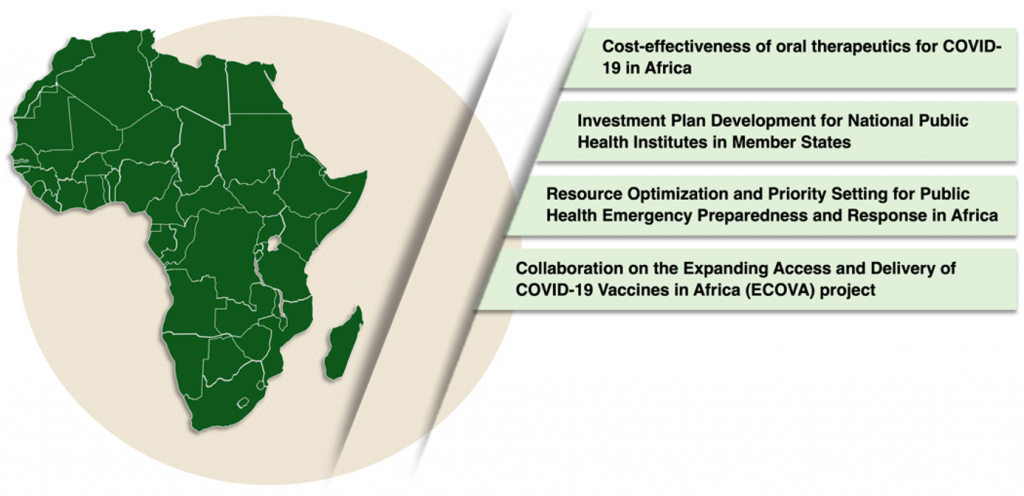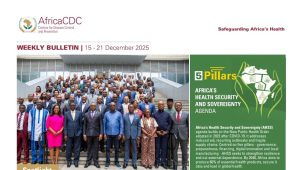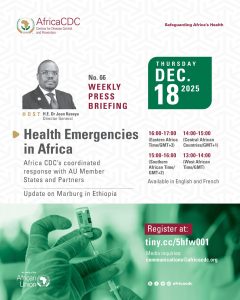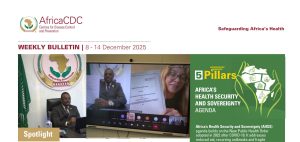Launch of Continental Framework to Support the Institutionalization of Evidence-Informed Priority-setting in Africa
The Africa Center for Disease Control and Prevention (Africa CDC) Heath Economics Programme launched a priority initiative to facilitate the development and roll-out of a continental strategy to promote the institutionalization of Evidence Informed Priority-setting (EIPS) at continental, regional and country levels across Africa. The initiative involves various ongoing activities which will develop the needed continental, regional and country-level priority-setting machinery to support the work of AU agencies (Africa CDC, African Medicines Agency, etc.) and develop a common approach to country institutionalization of evidence-informed priority setting for evidence-based health policies. This will include dedicated mechanisms to support countries to develop and implement governance structures and strengthen EIPS demand and supply capacity, working with other regional organizations and academic and research partners.
In June 2023, the Health Economics Programme organized and hosted the Member States and Stakeholders Technical Consultation Workshop to Establish a Common Vision for a Continental Framework to support the institutionalization of evidence informed priority-setting in Africa. The workshop was expected to provide a platform for engaging with Member States on their key goals and needs related to priority-setting, and landscape Partner support in this area. These insights are shaping the ongoing development of a Continental Framework to Support the Institutionalization of Evidence-Informed Priority-setting in Africa, led by the HEP in collaboration with an expert working group.
The workshop saw great participation from Member States, with seventeen (17) Member States represented, including senior members from Directorates of Planning, Policy and Finance across Ministries of Health and Ministry of Health Technical Health Economics experts representing the 5 regions of the African Union. In addition, attendance of Regional Economic Community delegations from the Intergovernmental Authority on Development (IGAD), the Indian Ocean Commission (IOC) and the East African Community (EAC); as well as various technical and funding partners on the continent, was recorded including Centre for Global Development (CGD), Global Fund to Fight AIDS, Tuberculosis and Malaria, World Health Organization (WHO), Bill and Melinda Gates Foundation, GAVI, the Vaccine Alliance, CHAI (Clinton Health Access Initiative), Norwegian Institute of Public Health, Agence Française de Développement (AFD), Kenya Medical Research Institute (KEMRI) and the Norwegian Agency for Development Cooperation (NORAD).
Senior members from Directorates of Planning, Policy and Finance and Technical Health Economics experts across Ministries of Health representing 17 Member States across the 5 regions of the African Union, and Regional Economic Community delegates convene in Nairobi for the Member States and Stakeholders Technical Consultation Workshop to Establish a Common Vision for a Continental Framework to Support the Institutionalization of Evidence-Informed Priority-setting in Africa. Opening remarks were delivered by the Deputy Director General, Ministry of Health, Kenya, Dr Sultani Matendechero (center), pictured below with the Africa CDC Health Economics Programme team.
In capitalizing on this mandate, the HEP has also established a platform which will foster coordinated, harmonized, and contextually relevant support to Member States in their journey towards effective implementation and institutionalization of evidence-informed explicit priority-setting approaches for health benefit package design, acknowledged as a long-term process of capacity and institutional development. The first phase of this journey aimed to introduce policymakers and relevant stakeholders in the Member States to the concepts underlying systematic evidence-informed priority setting, its requirements and what it can achieve when done properly and obtain first-hand information from countries about where they are in relation to evidence-informed priority setting processes in the design/revision of benefits package design and corresponding resource allocation practices.
To this end, the HEP has also initiated a multi-phase capacity development and policy support programme to the Member States in Nairobi between 12 and 13 June 2023. This first 2-day workshop on the ‘Design and Development of Health Benefits Packages through Fair Priority Setting Processes in Africa’ focused on the Eastern region, targeting its 14 Member States. This workshop was co-created and facilitated with the collaboration of the WHO Bergen Center for Ethics and Priority Setting (BCEPS) and the Center for Global Development (CGD). In subsequent phases, the HEP aims to provide trainings on specific technical skills around undertaking evidence-informed explicit priority settings tailored to the country’s needs and existing gaps. Heath Economics Programme Flyer
About Africa CDC Heath Economics Programme
The HEP was established in November 2020 to provide technical and analytic health economics support to regional and national health systems across African Union (AU) Member States and Africa CDC’s strategic programmes. Our mission is to strengthen Africa’s capacity for generating and utilizing health economics evidence to improve public health decision-making and practice – equipping decision-makers with relevant evidence, expertise, and local capacity that translates into tangible results in accelerating equitable resource allocation, stronger, more efficient, and effective health systems, and healthier populations and communities for AU Member States.
In service of the Africa CDC and Member States, the HEP works by partnering with a broad ecosystem of stakeholders, including policymakers, health financing advocates, multilateral agencies, technical and implementing partners, CSOs, health economics groups, and academia. As our Programme gains momentum, we remain committed to driving meaningful change by maximizing our impact and reach through initiating and sustaining collaborative and harmonized approaches to realize our collective ambitions and ensuring responsiveness to Member State priorities.
Media inquiries:
Dorothy Wambeti Njagi, Senior Communication Officer – Policy, Health Diplomacy & Communication: Africa CDC | Tel: +251 940 559 950 | Email: njagid@africa-union.org







